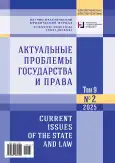The struggle against saboteurs and political banditry in the Tambov region during the Great Patriotic War (1941–1945)
- Authors: Sirotkina E.V.1
-
Affiliations:
- Derzhavin Tambov State University
- Issue: Vol 9, No 2 (2025)
- Pages: 174-181
- Section: General Theory and History of Law and the State
- URL: https://journal-vniispk.ru/2587-9340/article/view/295318
- DOI: https://doi.org/10.20310/2587-9340-2025-9-2-174-181
- ID: 295318
Cite item
Full Text
Abstract
During the Great Patriotic War (1941–1945), a struggle was waged not only on the front lines against German fascist forces and their allies, but also within the country against saboteurs and political groups who sought to undermine the country’s stability and facilitate the triumph of fascism. The purpose of this study is to examine the efforts of Tambov law enforcement agencies in combating the domestic enemy, who sought to prevent the Soviet people from overcoming the Nazi invaders. This research is based on the application of general scientific methods of investigation, such as analysis, synthesis, induction, and deduction. The methodological basis for the research is based on the principles of objectivity and historicism. The study concludes that the enemy aimed to achieve victory over the Soviet Union, including through the activities of saboteurs and political groups, which were composed of deserters, criminals, and individuals dissatisfied with Soviet rule and seeking to defect to the opposing side. The German military intelligence service (Abwehr) was involved in organizing the training and support of sabotage groups and political factions in order to instill fear and panic among civilians. These sabotage groups and factions were tasked with carrying out acts of terror-ism, robbery, murder, as well as spreading rumors and false information about the imminent defeat of Soviet forces and the benefits of living under German occupation. The law enforcement agencies in the Tambov region have managed to prevent the destructive activities of the “domestic enemy” and have made a significant contribution to the victory of the Soviet people in the fight against fascism during the 1941–1945. The practical findings of this study can be used to develop methods for countering attempts to destabilize Russia.
About the authors
Evgeniya V. Sirotkina
Derzhavin Tambov State University
Author for correspondence.
Email: evgsirotkina@yandex.ru
ORCID iD: 0000-0002-8905-6996
Cand. Sci. (History), Associate Professor, Associate Professor of the Theory and History of State and Law Department, Institute of Law and National Security
Russian Federation, 33 Internatsionalnaya St., Tambov, 392000, Russian FederationReferences
- Baranov V.N., Klimov A.A. (2020). The historical experience of use NKVD troops of the USSR in the battle for the caucasus during The Great Patriotic War. Voprosy Nacional’nyh i Federativnyh Otnoshenij = Issues of National and Federal Relations, vol. 10, no. 11 (68), pp. 2560-2569. (In Russ.) https://doi.org/10.35775/PSI.2020.68.11.001, https://elibrary.ru/evcldh
- Bondarenko A.Yu. (2020). Heroes of “SMERSH”. Moscow, Molodaya gvardiya Publ., 388 p. (In Russ.)
- Bondarenko A.Yu. (2011). Military Counterintelligence. 1918–2010. Moscow, Molodaya gvardiya Publ., 496 p. (In Russ.)
- Bondarenko A.Yu., Efimov N.N. (2015). The Road to Victory. The Great Patriotic War through the Eyes of Modern Historians and Generals. Moscow, Veche Publ., 368 p. (In Russ.)
- Korovin V.V. (2003). Soviet Intelligence and Counterintelligence during the Great Patriotic War. Moscow, Rus Publ., 312 p. (In Russ.) https://elibrary.ru/qotrfn
- Lysenkov S.G., Sidorenko V.P. (2012). The internal troops of the NKVD of the USSR in the battle for the Caucasus. Vestnik Sankt-Peterburgskogo universiteta MVD Rossii = Bulletin of St. Petersburg University of the Ministry of Internal Affairs of Russia, no. 4 (52). pp. 24-30. (In Russ.) https://elibrary.ru/pyambr
- Sidorenko V.P. (2019). Activity of NKVD Troops in the North Caucasus in 1941-1943 (to the 75th Anniversary of the Great Victory of the Soviet People). Russian Colonial Studies, no. 4. pp. 107-135. (In Russ.) https://elibrary.ru/dbbxuk
- The World War 1939–1945. (1957). Moscow, Foreign Languages Publishing House, 538 p. (In Russ.)
- Petrov N.V. (2010). Who Led the State Security Agencies 1941–1954. Moscow, Zven’ya Publ., 1008 p. (In Russ.)
- Ostryakov S.Z. (1979). Military Security Officers. Moscow, Military Publ., 320 p. (In Russ.)
- Ivanov L. (2023). The Truth about SMERSH. Moscow, Yauza-press Publ., 320 p. (In Russ.)
Supplementary files

Note
Author’s contribution
E.V. Sirotkina – concept development, selection and analysis of documents and scientific literature, writing – original draft preparation.







